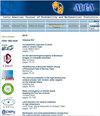Large Deviations for the SSEP with slow boundary: the non-critical case
IF 0.6
4区 数学
Q4 STATISTICS & PROBABILITY
Alea-Latin American Journal of Probability and Mathematical Statistics
Pub Date : 2021-07-14
DOI:10.30757/alea.v20-13
引用次数: 4
Abstract
We prove a large deviations principle for the empirical measure of the one dimensional symmetric simple exclusion process in contact with reservoirs. The dynamics of the reservoirs is slowed down with respect to the dynamics of the system, that is, the rate at which the system exchanges particles with the boundary reservoirs is of order $n^{-\theta}$, where $n$ is number of sites in the system, $\theta$ is a non negative parameter, and the system is taken in the diffusive time scaling. Two regimes are studied here, the subcritical $\theta\in(0,1)$ whose hydrodynamic equation is the heat equation with Dirichlet boundary conditions and the supercritical $\theta\in(1,+\infty)$ whose hydrodynamic equation is the heat equation with Neumann boundary conditions. In the subcritical case $\theta\in(0,1)$, the rate function that we obtain matches the rate function corresponding to the case $\theta=0$ which was derived on previous works (see \cite{blm,flm}), but the challenges we faced here are much trickier. In the supercritical case $\theta\in(1,+\infty)$, the rate function is equal to infinity outside the set of trajectories which preserve the total mass, meaning that, despite the discrete system exchanges particles with the reservoirs, this phenomena has super-exponentially small probability in the diffusive scaling limit.具有慢边界的SSEP的大偏差:非关键情况
我们证明了与储层接触的一维对称简单排除过程的经验测度的一个大偏差原理。储层的动力学相对于系统的动力学是减慢的,也就是说,系统与边界储层交换粒子的速率为$n^{-\theta}$阶,其中$n$是系统中的位置数,$\ttheta$是非负参数,系统采用扩散时间标度。本文研究了两种状态,亚临界$theta\in(0,1)$,其流体动力学方程是具有Dirichlet边界条件的热方程。在次临界情况$\theta\In(0,1)$中,我们获得的速率函数与根据以前的工作推导出的情况$\θ=0$对应的速率函数相匹配(见\cite{blm,flm}),但我们在这里面临的挑战要棘手得多。在超临界情况$\theta\In(1,+\infty)$中,速率函数在保持总质量的轨迹集之外等于无穷大,这意味着,尽管离散系统与储层交换粒子,但这种现象在扩散标度极限中具有超指数小概率。
本文章由计算机程序翻译,如有差异,请以英文原文为准。
求助全文
约1分钟内获得全文
求助全文
来源期刊

Alea-Latin American Journal of Probability and Mathematical Statistics
STATISTICS & PROBABILITY-
CiteScore
1.10
自引率
0.00%
发文量
48
期刊介绍:
ALEA publishes research articles in probability theory, stochastic processes, mathematical statistics, and their applications. It publishes also review articles of subjects which developed considerably in recent years. All articles submitted go through a rigorous refereeing process by peers and are published immediately after accepted.
ALEA is an electronic journal of the Latin-american probability and statistical community which provides open access to all of its content and uses only free programs. Authors are allowed to deposit their published article into their institutional repository, freely and with no embargo, as long as they acknowledge the source of the paper.
ALEA is affiliated with the Institute of Mathematical Statistics.
 求助内容:
求助内容: 应助结果提醒方式:
应助结果提醒方式:


